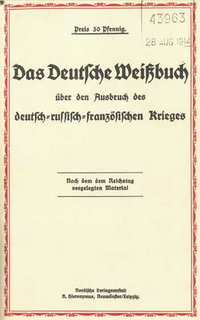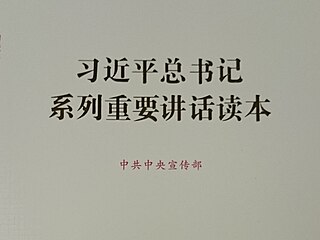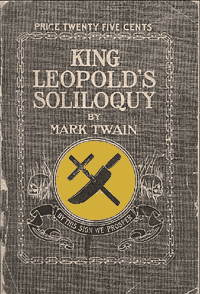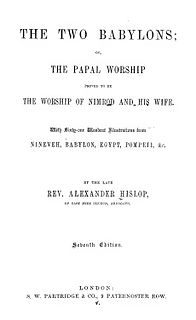 W
WAmerican Freedom and Catholic Power is an anti-Catholic book by American writer Paul Blanshard, published in 1949 by Beacon Press. Blanshard asserted that America had a "Catholic problem" in that the Church was an "undemocratic system of alien control". The book has been described as propaganda and as "the most unusual bestseller of 1949–1950". Some reviewers thought that the book incorporated nativist sentiments into its anti-Catholicism, including that the Church was a foreign power in America determined to dominate the world. In the prologue, Blanshard said that he was not opposed to the Catholic religion or to Catholic Americans, but that the church's hierarchy had an undue influence on legislation, education and medical practice.
 W
WThe Brown Book of the Reichstag Fire and Hitler Terror is a book published in Paris, France in August 1933 and written by an anti-fascist group including German communist Willi Munzenberg, Hans Siemsen and Gustav Regler. It put forth the theory that Nazis were behind the Reichstag fire of February 27, 1933.
 W
WThe Charter of the Malagasy Socialist Revolution was the guiding document of the Democratic Republic of Madagascar, established by the "Red Admiral" Didier Ratsiraka, President of Madagascar and head of the Supreme Revolutionary Council from 1975 to 1993. The Charter was commonly known as the Red Book or the Little Red Book due to the colour of the standard issue's cover (and in possible reference to the Quotations from Chairman Mao Tse-tung, known popularly as Mao's Little Red Book).
 W
WIn diplomatic history, a color book is an officially sanctioned collection of diplomatic correspondence and other documents published by a government for educational or political reasons, or to promote the government position on current or past events. The earliest were the British Blue Books, dating to the 17th century. In World War I, all the major powers had their own color book, such as the German White Book, the Austrian Red Book, Russian Orange Book, and more.
 W
WThe Congo Free State propaganda war was a worldwide media propaganda campaign waged by both King Leopold II of Belgium and the critics of the Congo Free State. Leopold was very astute in using the media to support his virtual private control of the Congo. British campaigner Edmund Dene Morel successfully campaigned against Leopold and focused public attention on the violence of Leopold's rule. Morel used newspaper accounts, pamphlets, and books to publish evidence from reports, eye-witness testimony, and pictures from missionaries and others involved directly in the Congo. As Morel gained high-profile supporters, the publicity generated by his campaign eventually forced Leopold to relinquish control of the Congo to the Belgian government.
 W
WCrux Ansata, subtitled 'An Indictment of the Roman Catholic Church' by H. G. Wells is a (96-page) wartime book first published in 1943 by Penguin Books, Harmondsworth : Penguin Special No. 129. The U. S. edition was copyrighted and published in 1944 by Agora Publishing Company, New York, with a portrait frontispiece and an appendix of an interview with Wells recorded by John Rowland. The U.S. edition of 144 pages went into a third printing in August 1946.
 W
WFinnlands Lebensraum is a 1941 Finnish propaganda book that was published to support the Greater Finland ideology. It was written by the geographer Väinö Auer, the historian Eino Jutikkala and the ethnographer Kustaa Vilkuna, who worked for the Finnish state propaganda and information department. National Socialist ideas were later added to the script by Yrjö von Grönhagen, a Finnish military attaché in Berlin.
 W
WFor My Legionaries is an autobiographical book by Iron Guard leader Corneliu Zelea Codreanu first published in 1936.
 W
WGeneral Secretary Xi Jinping important speech series is a book of statements from speeches by Xi Jinping, the current General Secretary of the Communist Party of China, published in 2014 and 2016 and widely distributed during Xi's administration. The book was originally compiled by Party's Publicity Department and published by official People's Publishing House and Study Publishing House. The Party's Organization Department has ordered Communist cadres and university students to study the book and learn "the spirit of the General Secretary's speeches."
 W
WThe German White Book was a publication by the German government of 1914 documenting their claims for the causes of World War I.
 W
WGo Ask Alice is a 1971 book about a teenage girl who develops a drug addiction at age 15 and runs away from home on a journey of self-destructive escapism. Attributed to "Anonymous", the book is in diary form, and was originally presented as being the edited "real diary" of the unnamed teenage protagonist. Questions about the book's authenticity and true authorship began to arise in the late 1970s, and it is now generally viewed as a found manuscript-styled fictional work written by Beatrice Sparks, a therapist and author who went on to write numerous other books purporting to be real diaries of troubled teenagers. Some sources have also named Linda Glovach as a co-author of the book. Nevertheless, its popularity has endured, and as of 2014 it had remained continuously in print since its publication over four decades earlier.
 W
WThe Governance of China is a three-volume collection of speeches and writings by Xi Jinping, the General Secretary of the Chinese Communist Party and current paramount leader of China. Presenting the official party line for China's development in the 21st century, the collection is an authoritative source on Xi Jinping Thought and a literary successor to Chairman Mao Zedong's Quotations from Chairman Mao Tse-tung.
 W
WThe Green Book is a short book setting out the political philosophy of Libyan leader Muammar Gaddafi. The book was first published in 1975 and was "intended to be read by all people". It is said to have been inspired in part by The Little Red Book. Both were widely distributed both inside and outside their country of origin, and "written in a simple, understandable style with many memorable slogans". An English translation was issued by the Libyan People's Committee, and a bilingual English/Arabic edition was issued in London by Martin, Brian & O'Keeffe in 1976. During the Libyan Civil War, copies of the book were burned by anti-Gaddafi demonstrators.
 W
WKing Leopold's Soliloquy is a 1905 pamphlet by American author Mark Twain. Its subject is King Leopold's rule over the Congo Free State. A work of political satire harshly condemnatory of his actions, it ostensibly recounts a fictional monologue of Leopold II speaking in his own defense.
 W
WLeicester's Commonwealth (1584) is a scurrilous book that circulated in Elizabethan England and attacked Queen Elizabeth I's favourite, Robert Dudley, Earl of Leicester. The work was read as Roman Catholic propaganda against the political and religious policy of Elizabeth I's regime, particularly the Puritan sympathies fostered by Leicester. In doing so, it portrayed Leicester as an amoral opportunist of "almost satanic malevolence" and circulated lurid stories of his supposed scandalous deeds and dangerous plots.
 W
WMein Kampf is a 1925 autobiographical manifesto by Nazi Party leader Adolf Hitler. The work describes the process by which Hitler became antisemitic and outlines his political ideology and future plans for Germany. Volume 1 of Mein Kampf was published in 1925 and Volume 2 in 1926. The book was edited first by Emil Maurice, then by Hitler's deputy Rudolf Hess.
 W
WAllegedly authored in spring 1933 by German national-conservative politician Ernst Oberfohren, the Oberfohren Memorandum advocated, that the Reichstag fire of February 27, 1933 had been planned by Hermann Göring and Joseph Goebbels and carried out by a group of National Socialist officers. Although rejected as a fabrication by the Nazis, its origins remained mainly unclear until the end of World War II. From 1959 to 1962 author Fritz Tobias published his research in Der Spiegel magazin and in his work The Reichstag Fire: Legend and Truth, asserting that the document was a forgery, produced and circulated in 1933 by German Communist journalist émigrés in France.
 W
WQuotations from Chairman Mao Tse-tung is a book of statements from speeches and writings by Mao Zedong, the former Chairman of the Chinese Communist Party, published from 1964 to about 1976 and widely distributed during the Cultural Revolution.
 W
WThe Ruhnama, or Rukhnama translated in English as Book of the Soul, is a two volume work written by Saparmurat Niyazov, the President of Turkmenistan from 1990 to 2006. It was intended to serve as a tool of state-propaganda, emphasizing the basis of Turkmen nation.
 W
WThe Tale of the Princes of Vladimir is an early 16th-century Muscovite treatise which propounds the conception of Moscow as the Third Rome. The book traces the male-line descent of Muscovy's royal family not only from Rurik, but from a certain Prus, to whom his uncle, Emperor Augustus, gave the northern part of the world, which later came to be known as "Prussia".
 W
WThe Two Babylons, subtitled Romanism and its Origins, is a religious pamphlet published in 1853 by the Presbyterian Free Church of Scotland theologian Alexander Hislop (1807–65).
 W
WWays That Are Dark: The Truth About China is a 1933 non-fiction book by Ralph Townsend which presents Townsend's observations on the state of then-contemporary China. The book is considered an anti-Chinese polemic.
 W
WThe Zweites Buch, published in English as Hitler's Secret Book and later as Hitler's Second Book, is an unedited transcript of Adolf Hitler's thoughts on foreign policy written in 1928; it was written after Mein Kampf and was not published in his lifetime.